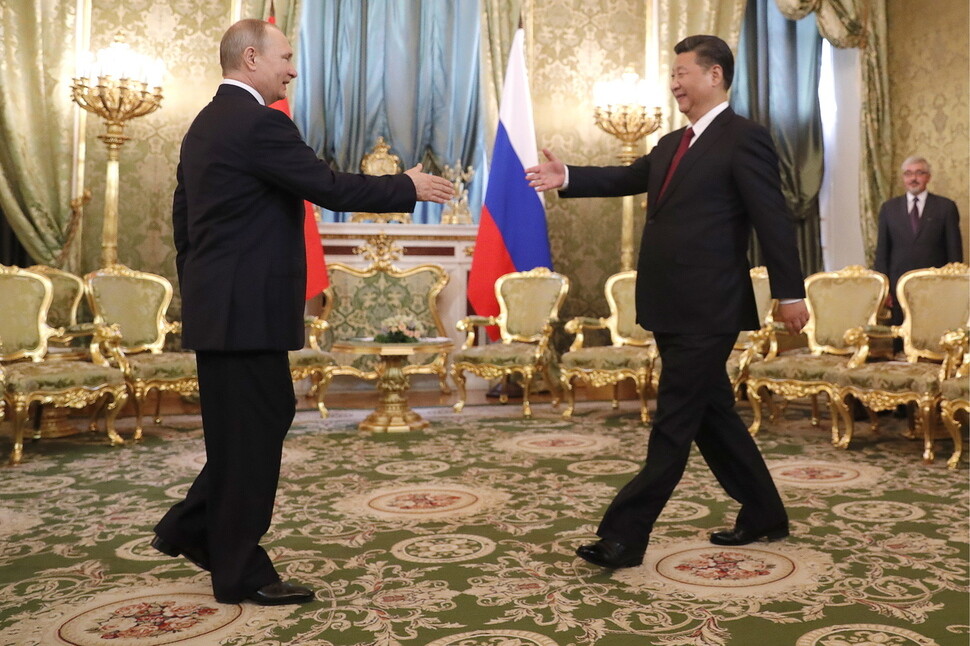hankyoreh
Links to other country sites 다른 나라 사이트 링크
China and Russia affirm close relations over North Korea and THAAD issues

China and Russia showed off their solid bonds ahead of the G-20 Summit in Hamburg on July 7-8, the former as it faces attempted controls by the US and the latter as it faces Western sanctions.
Chinese President Xi Jinping and Russian President Vladimir Putin expressed concern about North Korea‘s intercontinental ballistic missile (ICBM) launch, but continued to voice firm opposition to deployment of a THAAD missile defense system on the Korean Peninsula. Indeed, opposition to THAAD now appears to be a key link in Beijing and Moscow’s close relationship.
Xi and Putin met at the Kremlin in Moscow on July 4 to sign joint statements on intensifying their full-scale strategic partnership and on “the current world situation and major international issues” and to ratify terms for implementation of their Treaty for Good Neighborliness, Friendship and Cooperation over the next three years. The treaty, which was signed in 2001, took the place of an alliance treaty that expired in 1980. The two leaders also looked on while Chinese Foreign Minister Wang Yi and Russian counterpart Sergey Lavrov signed a joint statement on Korean Peninsula issues.
The statement on Korean peninsula issues offers a clear picture of the two countries’ planned coordination on the North Korean nuclear issue. In it, they called North Korea’s ICBM test launch on July 4 a violation of UN Security Council resolutions, which it urged Pyongyang to abide by. At the same time, they reiterated China‘s proposed “two halts” solution, in which South Korea and the US would halt their large-scale military exercises in exchange for North Korea halting its nuclear and missile development. They also stressed the need for a peace regime in Northeast Asia and a “package settlement” on the nuclear and other Korean Peninsula issues. The two sides further expressed their support for dialogue and improvements in inter-Korean relations, stressing that North Korea’s “reasonable concerns” about the security of its regime should be respected.
The position from Beijing and Moscow was seen as a reiteration of their existing stance on resolution of the nuclear issue despite their concerns about North Korea’s ICBM development. It’s a situation that could turn into a standoff if the US and Japan insist on increasing pressure against Pyongyang. The Korean Peninsula statement also reaffirmed China and Russia’s position calling for an “immediate halt to the deployment of THAAD, which is infringing upon regional strategic security interests.” The statement further noted that “some countries” were “using responding to a threat as a pretext to unilateral deploy missile defense systems in Europe and Asia, causing serious harm to the strategic security interests of countries in the region, including China and Russia.” It’s a message that clearly spells out their opposition to THAAD, which is characterized as part of the US‘s global missile defense system.
The state-owned China Development Bank also decided on July 4 to invest a total of US$11 billion (around 13 trillion won) in the Russian Direct Investment Fund, a Russian sovereign wealth fund, and in the Russian-owned development bank Vnesheconombank (VEB). The Financial Times described the successful courting of Chinese investment as the fruit of long efforts by Russia, which has faced Western sanctions amid the situation in Ukraine.
In a July 3 interview with Russian media, Xi declared that the “full-scale partnership relationship between China and Russia is enjoying the best time in its history,” citing high levels of mutual political and strategic trust, senior-level exchanges and cooperation in various areas, positive linkages to each side’s development strategies, and close strategic cooperation on international and regional issues. Xi wrapped up his two-day schedule in Russia on July 4 after being awarded Russia‘s highest honor - the Order of St. Andrew the Apostle - by Putin, and arrived in Berlin later that evening.
By Kim Oi-hyun, Beijing correspondent
Please direct questions or comments to [english@hani.co.kr]

Editorial・opinion
![[Column] Season 2 of special prosecutor probe may be coming to Korea soon [Column] Season 2 of special prosecutor probe may be coming to Korea soon](https://flexible.img.hani.co.kr/flexible/normal/500/300/imgdb/original/2024/0426/3317141030699447.jpg) [Column] Season 2 of special prosecutor probe may be coming to Korea soon
[Column] Season 2 of special prosecutor probe may be coming to Korea soon![[Column] Park Geun-hye déjà vu in Yoon Suk-yeol [Column] Park Geun-hye déjà vu in Yoon Suk-yeol](https://flexible.img.hani.co.kr/flexible/normal/500/300/imgdb/original/2024/0424/651713945113788.jpg) [Column] Park Geun-hye déjà vu in Yoon Suk-yeol
[Column] Park Geun-hye déjà vu in Yoon Suk-yeol- [Editorial] New weight of N. Korea’s nuclear threats makes dialogue all the more urgent
- [Guest essay] The real reason Korea’s new right wants to dub Rhee a founding father
- [Column] ‘Choson’: Is it time we start referring to N. Korea in its own terms?
- [Editorial] Japan’s rewriting of history with Korea has gone too far
- [Column] The president’s questionable capacity for dialogue
- [Column] Are chaebol firms just pizza pies for families to divvy up as they please?
- [Column] Has Korea, too, crossed the Rubicon on China?
- [Correspondent’s column] In Japan’s alliance with US, echoes of its past alliances with UK
Most viewed articles
- 1‘We must say no’: Seoul defense chief on Korean, USFK involvement in hypothetical Taiwan crisis
- 2After election rout, Yoon’s left with 3 choices for dealing with the opposition
- 3Why Kim Jong-un is scrapping the term ‘Day of the Sun’ and toning down fanfare for predecessors
- 4AI is catching up with humans at a ‘shocking’ rate
- 5Two factors that’ll decide if Korea’s economy keeps on its upward trend
- 6[Column] Park Geun-hye déjà vu in Yoon Suk-yeol
- 7Division commander ordered troops to enter raging flood waters before Marine died, survivor says
- 8Gangnam murderer says he killed “because women have always ignored me”
- 9South Korea officially an aged society just 17 years after becoming aging society
- 10No good, very bad game for Korea puts it out of Olympics for first time since 1988